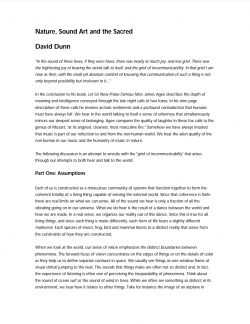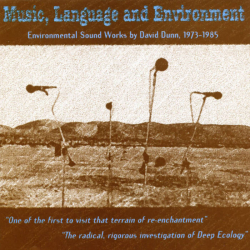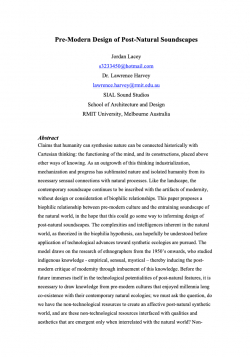Nature, Sound Art and the Sacred

Type
Publication
Authors
Dunn ( David Dunn )
Category
Article
[ Browse Items ]
Publication Year
1997
URL
[ private ]
Abstract
"In the sound of these foxes, if they were foxes, there was nearly as much joy, and less grief. There was
the frightening joy of hearing the world talk to itself, and the grief of incommunicability. In that grief I am
now as then, with the small yet absolute comfort of knowing that communication of such a thing is not
only beyond possibility but irrelevant to it..."
In the conclusion to his book, Let Us Now Praise Famous Men, James Agee describes the depth of
meaning and intelligence conveyed through the late night calls of two foxes. In his nine page
description of these calls he invokes archaic sentiments and a profound contradiction that humans
must have always felt. We hear in the world talking to itself a sense of otherness that simultaneously
mirrors our deepest sense of belonging. Agee compares the quality of laughter in these fox calls to the
genius of Mozart, "at its angriest, cleanest, most masculine fire." Somehow we have always intuited
that music is part of our reflection to and from the non-human world. We hear the alien quality of the
non-human in our music and the humanity of music in nature.
The following discussion is an attempt to wrestle with the "grief of incommunicabilty" that arises
through our attempts to both hear and talk to the world...
the frightening joy of hearing the world talk to itself, and the grief of incommunicability. In that grief I am
now as then, with the small yet absolute comfort of knowing that communication of such a thing is not
only beyond possibility but irrelevant to it..."
In the conclusion to his book, Let Us Now Praise Famous Men, James Agee describes the depth of
meaning and intelligence conveyed through the late night calls of two foxes. In his nine page
description of these calls he invokes archaic sentiments and a profound contradiction that humans
must have always felt. We hear in the world talking to itself a sense of otherness that simultaneously
mirrors our deepest sense of belonging. Agee compares the quality of laughter in these fox calls to the
genius of Mozart, "at its angriest, cleanest, most masculine fire." Somehow we have always intuited
that music is part of our reflection to and from the non-human world. We hear the alien quality of the
non-human in our music and the humanity of music in nature.
The following discussion is an attempt to wrestle with the "grief of incommunicabilty" that arises
through our attempts to both hear and talk to the world...
Description
http://davidddunn.com/~david/writings/terrnova.pdf
Number of Copies
1
| Library | Accession No | Call No | Copy No | Edition | Location | Availability |
|---|---|---|---|---|---|---|
| Main | 160 | 1 | Yes |


